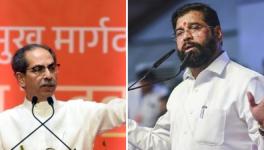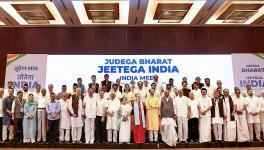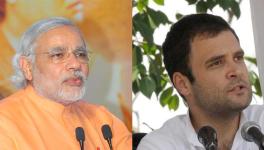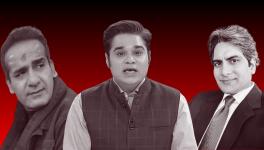Fighting Corruption or Politics of Narcissism?
One of the effects of electronic media is the overwhelming need people have for visual gratification. Be it the political class or the civil society, the need to be in the public eye or more accurately in the camera lens seems to dominate over sensible politics.
The game of one up-man ship, serial hunger fasts rapidly turning to hungerfests, the demand for prime time television – all negotiations must be televise -- seems to be overshadowing corruption itself.
What distinguishes the current phase of “primitive” accumulation is not only its enormously expanded scale but also that business and politics has become virtually indistinguishable. The Sharad Pawar family, the Karunanidhi family today are bigger than major business houses in the country barring a few. From cronies of capital – this is what the bureaucracy and politicians were earlier -- they have now become gen-next capitalists.
If we remember, the earlier license-permit raj was claimed to be the cause of corruption. Once we dismantle it –or so the neo-liberal song ran – corruption would also end. Instead, we have seen the frightening growth of corruption accompanying market “reforms”. In country after country that have adopted the neo-liberal mantra, corruption has grown to mammoth proportions, India being no exception. That is why Stiglitz, the former Chief Economist at the World Bank called the neo-liberal prescriptions of privatisation, “free” market, “free” trade, and “free” flow of capital as 4-steps for plundering third world economies and pauperising their people.
The simple fact remains that state will always either own or regulate scarce natural resources – be it spectrum or gas or minerals or land. They are always limited and markets do not operate where resources are limited. If we want to fight this transfer of nation's resources at throw-away prices, we have to fight how these resources are being allocated and for what purpose. The issue of corruption in the way that is being raised is merely addressing to whom are these resources being transferred, why transfer to A instead of B. While it is an important question, it is a poverty of politics if it ends up being the only one.
It is this inability to address the basic questions facing us today that the middle-class struggle against corruption turns not to substance but to “shows” --sitting in Rajghat or
Jantar Mantar, hunger strikes and above all, television as the prime driver of the movement.
The middle class has virtually opted out of electoral democracy today – it does not vote and regards all elected representatives as crooks. For them, the solution does not lie in recovering democracy from the mess it is in and creating structures of accountability and good governance. It is not about reclaiming the state but virtually abandoning it.
The middle class hankers for a quick-fix solution that will solve all the problems of democracy without their having to do too much about it. This is where 24x7 news channels and the middle class interests intersect. TV channels want news that is safe – it should not hurt the sponsors who pay the advertisement bills. Fighting corruption without fighting the business houses that are corrupting the polity, focussing on a few expendable political figures, is ideal. It keeps ratings high and does not hurt either the ad revenue or “paid” news. The middle class does not want go to the trouble organising for the long haul. Instead, a Anna Hazare or a Baba Ramdev should solve their problems with a hunger fast or two. Instant democracy with 24x7 feed from the TV screen.
The revolution in communication – internet and the explosion of mobile telephony – has liberated content from the control of media houses and governments. It is no longer possible to control news as content is generated continuously through blogs, twitter and facebook. But all this has its flip side as well. Instead of a place for communicating to your friends, it has also become a race for eye-balls. What was earlier the characteristic of the electronic media – the hunt for eyeballs -- now becomes the obsession of all. From privacy, the concern now is shifting; from why are people watching me to why are people not watching me.
It is this politics of instant gratification combined with the need to be watched continuously that is changing politics. Narcissism is integral to today's politics. It is more important to be on TV than build a movement. From mass movements, we are now in the era of mass communications.
While a Lok Pal Bill is important, this should not be a quick-fix substitute for the larger issue of corruption. The focus of “civil society” seems to be that all their demands should be accepted without demur or question by the Parliament. While Anna Hazare and others have accepted that the parliament “could” discuss the Bill, in the next breath they also state that the Bill has to be passed by 15th August, precluding any meaningful discussion there.
Get the latest reports & analysis with people's perspective on Protests, movements & deep analytical videos, discussions of the current affairs in your Telegram app. Subscribe to NewsClick's Telegram channel & get Real-Time updates on stories, as they get published on our website.























